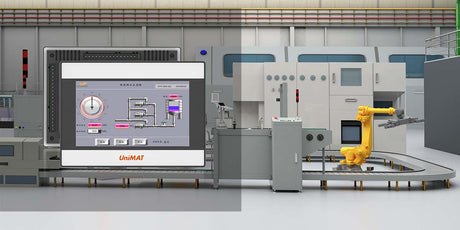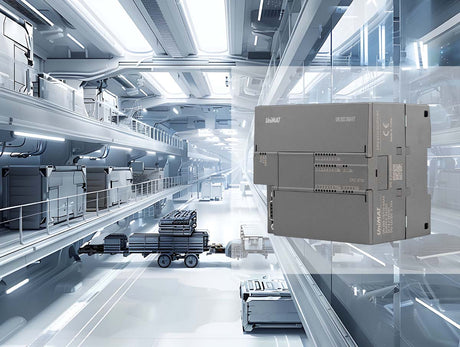En la automatización industrial, seleccionar el controlador lógico programable (PLC) correcto puede afectar significativamente la eficiencia del sistema, la escalabilidad y los costos a largo plazo. Dos tipos principales dominan el mercado: PLC modulares y PLC fijos . Comprender sus diferencias es crucial para tomar una decisión informada. En este artículo, comparamos los PLC modulares con los PLC fijos, destacamos sus ventajas y desventajas, y explicamos por qué los PLC Unimat , que ofrecen ambos tipos con compatibilidad con Siemens, precios competitivos y garantías sólidas, son la mejor opción para las empresas.

PLC modular vs. PLC fijo: Diferencias clave de un vistazo
| Característica | PLC modular | PLC fijo |
|---|---|---|
| Diseño | Personalizable con módulos intercambiables. | Unidad todo en uno preconfigurada. |
| Escalabilidad | Módulos de E/S, comunicación y especialidades ampliables. | E/S fija; limitada a la capacidad incorporada. |
| Costo | Mayor inversión inicial, menores costos a largo plazo para actualizaciones. | Costo inicial más bajo, pero menos flexible. |
| Aplicaciones | Ideal para sistemas complejos y en evolución (por ejemplo, grandes fábricas, tratamiento de agua). | Ideal para tareas simples y estáticas (por ejemplo, máquinas pequeñas, transportadores). |
| Mantenimiento | El fácil reemplazo del módulo reduce el tiempo de inactividad. | Es posible que sea necesario reemplazar toda la unidad si falla un componente. |
¿Cuándo elegir un PLC modular?
Los PLC modulares destacan en escenarios que requieren adaptabilidad y crecimiento:
Sistemas escalables : agregue módulos de E/S (digitales, analógicos o de red) a medida que se expande su operación.
Procesos complejos : integre módulos especializados para control de movimiento, lazos PID o sistemas de seguridad.
Preparación para el futuro : actualice el hardware sin tener que revisar todo el sistema de control.
Ejemplos de aplicaciones:
Líneas de montaje de automóviles.
Plantas de procesamiento químico.
Automatización de edificios inteligentes.
¿Cuándo elegir un PLC fijo?
Los PLC fijos son rentables para tareas sencillas e inmutables:
Necesidades de control simples : lógica básica de inicio/parada, cronometraje o conteo.
Restricciones de espacio : Las unidades compactas todo en uno caben en paneles de control estrechos.
Limitaciones presupuestarias : costos iniciales más bajos para proyectos de pequeña escala.
Ejemplos de aplicaciones:
Maquinas de embalaje.
Sistemas HVAC.
Cintas transportadoras para venta minorista.
PLC Unimat: acortando la distancia entre soluciones modulares y fijas
Unimat ofrece una gama versátil de PLC modulares y fijos diseñados para satisfacer diversas necesidades industriales. He aquí por qué se destacan:
1. Flexibilidad para cada proyecto
Serie PLC modular : construya un sistema personalizado con E/S expandibles, módulos de comunicación (Ethernet/IP, Profibus) y tarjetas especiales para un control avanzado.
Serie PLC fija : unidades compactas, listas para implementar, para tareas de automatización simples a un precio asequible.
2.Compatibilidad perfecta con Siemens
Los PLC Unimat están diseñados para integrarse sin esfuerzo con los ecosistemas PLC de Siemens, lo que permite a las empresas:
Reutilice la lógica y el código de Siemens existentes.
Conéctese a sistemas SCADA y HMI de Siemens.
Reduzca los costos de capacitación con interfaces de programación familiares.
3. Rendimiento rentable
Precios competitivos : los PLC Unimat ofrecen funcionalidad de nivel Siemens a costos entre un 20 y un 30 % más bajos.
Prueba de muestra gratuita : evalúe el rendimiento sin riesgos antes de realizar pedidos al por mayor.
Garantía de 3 años : la cobertura líder en la industria garantiza confiabilidad a largo plazo.
4. Resistente y confiable
Diseñado para soportar entornos hostiles (temperatura de funcionamiento: -25 °C a 70 °C).
Certificado según estándares de seguridad industrial (CE, UL, RoHS).
¿Cómo decidir entre PLC modulares y fijos?
Evalúe la complejidad del sistema : ¿Crecerán sus necesidades? Elija modular.
Calcular el costo total de propiedad (TCO): tenga en cuenta las actualizaciones futuras (modular) frente al reemplazo (fijo).
Evaluar las necesidades de integración : garantizar la compatibilidad con la maquinaria y el software existentes.
Para escenarios híbridos, los PLC modulares de Unimat pueden comenzar siendo pequeños y escalar, ofreciendo lo mejor de ambos mundos.

Preguntas frecuentes: PLC modulares vs. fijos
P: ¿Puedo actualizar un PLC fijo a un PLC modular más adelante?
R: No. Los PLC fijos tienen hardware fijo, pero los PLC modulares de Unimat permiten actualizaciones incrementales.
P: ¿Los PLC Unimat son compatibles con otras marcas además de Siemens?
R:Sí. Admiten protocolos universales como Modbus, CANopen y OPC UA.
Por qué los ingenieros confían en los PLC de Unimat
Ventaja del modo dual : elija modular o fijo según las necesidades del proyecto.
Soporte global : asistencia técnica 24 horas al día, 7 días a la semana y capacitación en sitio.
Sostenibilidad : Los diseños energéticamente eficientes reducen los costos operativos.
Conclusión
La elección entre PLC modulares y PLC fijos depende de la complejidad de su sistema, los requisitos de escalabilidad y el presupuesto. Para las empresas que buscan versatilidad, los PLC de Unimat ofrecen una ventaja única: combinan flexibilidad modular, simplicidad fija, compatibilidad con Siemens y una asequibilidad inigualable. Ya sea que esté automatizando una máquina pequeña o una planta en expansión, Unimat garantiza una solución preparada para el futuro.
¿Está listo para optimizar su sistema de automatización?
Comuníquese con Unimat hoy para solicitar una muestra gratuita de PLC o descargar especificaciones técnicas para comparar modelos.









